Gov. Charlie Baker and officials at some of the state’s top teaching hospitals are urging anyone experiencing symptoms of a heart attack or stroke, like chest pains or slurred speech, or other acute illness or injury not wait too long before heading to a nearby emergency room.
Fear of COVID-19 is sparking a noticeable drop in patients arriving at hospitals, officials said. That can result in patients waiting too long and arriving much sicker.
Baker said despite the increase in coronavirus hospitalizations -- nearly 4,000 -- hospitals have seen a decrease in other visits, for serious issues like heart problems, dialysis and cancer treatments.
"We know these medical conditions didn't stop when COVID-19 picked up," he said.
The governor urged people who are experiencing serious health issues to call their doctor or go to the emergency room. To help spread that message, he said six Boston-area hospitals have produced a series of public service announcements that will air on local television stations starting Thursday.
Local
In-depth news coverage of the Greater Boston Area.
"Children are coming in after several days with abdominal pain. They're coming in with a ruptured appendix," said Michael Apkon, CEO of Tufts Medical Center. "Patients with kidney disease are coming to the hospital too sick to be cared for and survive."
"We understand the fear that people have, but want people to know we are keeping people safe at the hospital. We're here to help you. We can keep you safe. Please don't delay care that might be vitally important at this time."
Gregg Meyer, chief clinical officer at Partners HealthCare, said they've seen a dramatic decrease in appendicitis, stroke and heart attack since the outbreak began.
"Massachusetts hospitals are open for business," he said. "We have the beds, we have the physicians, we have the nurses, we have the specialists. We have the resources to treat you. Do not let fear of COVID-19 keep you from the urgent care you need."
Hospital officials said another reason for a possible drop in emergency rooms visits are fewer car accidents because of the state’s stay-home advisory.
Baker also said Thursday that though the number of new coronavirus cases in Massachusetts has remained relatively stable over the past few days, the numbers are still high enough that people need to continue to stay home, non-essential businesses need to stay closed and people need to observe social distancing.
On Wednesday, Baker said the state is starting to see encouraging signs that the coronavirus surge may have plateaued, but noted it’s still too soon to make any real conclusions.
“The last few days we’ve seen fewer or about the same number of positive cases day to day, but we think it’s too soon to draw a conclusion from this data. A few days does not represent a trend. We’ve seen this data bounce around before,” he said.
Baker, who said the state is "now a national hotspot for COVID-19 infections," added that the number state health officials are watching most closely is the number of hospitalizations, and they are still seeing a modest increase there.
Get Boston local news, weather forecasts, lifestyle and entertainment stories to your inbox. Sign up for NBC Boston’s newsletters.
Massachusetts became the fourth state to in the U.S. to record more than 2,000 coronavirus deaths on Wednesday. It also announced that 1,744 more people tested positive. Right now, about 9% of all people who tested positive are hospitalized, but more than half of all 18,000 hospital beds available statewide, including makeshift ones, are currently unoccupied and available for patients.
Baker said until the surge has passed, it is too soon to talk about whether to reopen the economy. Right now, his stay-at-home advisory and non-essential business closure are set to expire on May 4.
"We think the issue going forward is going to be less about the date and essential and non-essential and more about the rules of the road," he said. "The rules will be relatively comprehensive and uniform and defined more depending on space than industry. Close contact operations would be one of the ones that would have to go through some sort of review to figure out if you can create the kind of safety needed (to reopen)."
The governor announced earlier this week that schools would remain shuttered through the end of the school year. Schools had previously been closed through May 4.
“It’s the right thing do, considering the facts on the ground at this point. At this point in time there is no authoritative guidance with respect to how to operate schools safely and how to get kids to and from school safely," Baker said.
Baker also announced that his order closing all non-emergency child care programs will be extended until June 29, with the exception of those that are serving first responders, grocery store employees and other essential workers.
The Associated Press contributed to this report.



